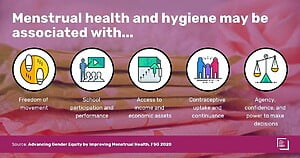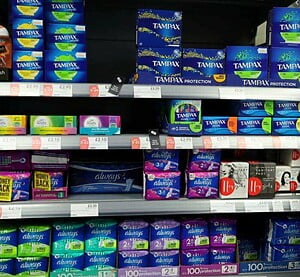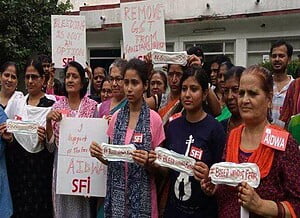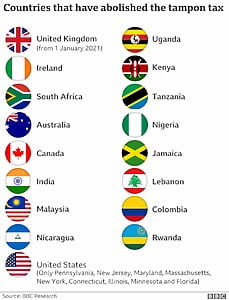In the 21st century, period poverty is still rife throughout the world.
Period poverty is defined as a lack of access to sanitary products as well as sanitary facilities, including safe toilets, water and handwashing facilities. In addition, it encompasses a general deficit in menstrual education and an enduring social stigma attached to periods.
Period poverty causes women and girls to improvise and use rags, toilet paper or, in extreme circumstances, even mud or soil.
This can seriously impact the mental and physical health of women and girls. The stigma attached to periods and the inability to deal with them leads to higher school and education dropout rates for women and worse career and future prospects.
Period poverty is not isolated to less developed countries, though it is far more common across Central and South America, parts of Asia and Africa. But even in the UK and across Europe and North America, period poverty is common, and evidence suggests that it is getting worse.
But let’s discuss how we can end period poverty.
In our globalised world, we all have the power to create positive change. Each step in the right direction will add up, and eventually, period poverty can be eradicated – we need to act with collective and individual responsibility.
Table of Contents
Improve Menstrual Education
Education is the first step in tackling deep-rooted social and health problems. Using education to end period poverty is no different.
Period poverty has been linked to anxiety, depression and other mental health issues. Many of these are linked to feelings of shame – we need to tackle the myths and social stigma of periods.
In some parts of the world, menstrual education is almost non-existent. As a result, girls can often have no idea about periods until they have their first. India is one prolific example where it’s estimated that some 71% of girls do not know what a period is prior to having their first one!
In the UK, almost half of girls (48%) aged between 14 – 21 are embarrassed by their periods.
Teaching girls what menstruation is seems rudimentary. While we might take biology and sex education for granted in the UK and Europe, this is an issue seldom discussed in many parts of the world. But, even in the UK, as the evidence shows, a massive amount of girls are still embarrassed by their periods.
Of course, every culture is different, but the evidence is clear, and women’s rights groups worldwide – from every culture – have been fighting for improved education. Even where cultural differences are inevitable, the call for improved education has been massive, and across Asia, Africa and Latin America, educational programs are generally embraced by women, even when longstanding cultural stigmas exist.
Tackle Misinformation and Myths
Menstruation is experienced by almost every woman of a certain age. It has been with us since the start – it is part of human biology and the biology of women and girls everywhere.
Educating girls and women about the facts surrounding menstruation is imperative to reinforce that menstruation is an important component of human biology.
Menstruation evolved as part of our ability to reproduce as a species – it is in our DNA – for both women and men.
Without it, you and I – we wouldn’t be here!
Despite menstruation being a core part of female biology since the first humans walked the Earth some 100,000 years ago, it is still shrouded in negative myths and stigma.
The cause of some of these taboos is complex. In ancient times, menstruation was viewed both positively and negatively. For example, the Romans and many Africa, South American and Asian civilisations considered periods to have magical power. This quickly became linked with black magic and evil spirits in some places. The symbology of blood is also mixed, but is often seen as a negative entity associated with death – something to be avoided and purged.
Many of these stigmas and taboos still exist today. In addition, religious beliefs also exacerbate menstrual stigma and myths.
Period myths and menstrual stigmas should be tackled with the facts:
- Menstruation is normal and healthy
- Menstruation is part of the female biology and anatomy and has been for thousands of years
- Menstruation is a reproductive process – it supports human life
- Menstrual blood itself is not ‘dirty’
- Menstruation itself is not a sign of health problems
Normalising periods is enormously important here.
Women and girls need to embrace this element of their biology and feel confident in discussing it and dealing with it without angst, stress, discrimination or anxiety.
Improve Sexual and Reproductive Health
Menstrual education also needs to focus on the physical health impacts of period poverty. To end period poverty is to end many of the health risks that women and girls have to endure due to poor or no sanitary products.
Period poverty is both a social and physical public health crisis. Without clean, hygienic sanitary products, women and girls are susceptible to an array of physical health problems ranging from bacterial vaginosis to urinary tract infections and even infertility. In some cases, these infections have been linked to sepsis which can be fatal.
Good menstrual health is not an option but a necessity.
Normalising periods and freeing them from the shackles of stigma and myths is not enough without guiding how to deal with them properly. For example, sanitary products are seldom used in many parts of the world – girls do not know what they are, let alone how to use them.
For example, in Tanzania, as few as 18% of girls and women use sanitary products, with the remainder improvising with rags, toilet roll or paper towels, etc.
Education on How to Manage Periods
Dispelling myths and social stigmas is hugely important to normalise periods and treat them as an objective component of female biology.
But this component of female biology has to be looked after and cared for, and nurtured!

Here, we have to teach women and girls that you need to use clean, hygienic, purpose-built products. Rags and toilet roll, etc, is not good enough for any woman – even when perceived to be clean – and every girl and woman deserves better.
Menstrual health programmes need to cover why sanitary products are needed as well as how to use them. This is important for many aspects of female health. It increases confidence, agency and independence. Being confident with menstrual health management will help women and girls stay in school and work.
Improve Access to Products
Education will not end period poverty without improved access to sanitary products.
Across many countries, sanitary products are unaffordable, or they simply cannot be accessed at all. Sanitary products are a multi-billion industry, and they’ve been highlighted as an ‘opportunity for business’ with the industry projected to be worth some $55 billion by 2027! It’s amazing that so many period product choices are available whilst very basics are still so lacking!

Awareness of menstrual health is increasing – big pharma sees this as a marketing opportunity and is always looking to make more money off women and girls – often money that women and girls don’t have.
Even in the UK, 1 in 10 girls has not been able to afford sanitary products at some point. But in countries like India, for example, some 70 million women and girls live on less than $1.90 a day. This makes sanitary products unaffordable, even when they know that they need them.
Making Pads Free or Affordable
In 2020, MPs in Scotland approved a bill to make period products across the country entirely free. This bill makes it the legal responsibility of local councils to provide period products to ‘anyone that needs them’.
This heightened the profile of discussions surrounding period poverty in the UK, which is worsening.
In developing countries, it’s largely down to charities and NGOs to distribute free pads whilst the government works to make sanitary products cheaper.
One way they can do this is by eradicating the ‘tampon tax’, which will happen in the UK by 2021, it was eradicated in India in 2018 and is now becoming a widespread initiative across Africa at least.
Government efforts to eradicate period poverty are becoming more common thanks to campaigning and activism by women’s rights groups. Kenya, for example, has been distributing sanitary products freely available through schools.
Support Brands That Care
As mentioned, sanitary products are a multi-billion industry, and the primary stakeholders are major pharmaceutical companies.
Period products are not cheap, costing thousands of pounds over a woman’s life in the UK.
Profits from these products line the pockets of billionaires who are profiting from women’s biology. It could be argued that in return, women get the choice of many types of high-tech period products that are built with super-absorptive materials and all the rest of it.
But, in reality, many of these synthetic materials are not beneficial for women and may even be harmful.
The problem is, that sanitary products are not regulated as medical goods. That means that whilst manufacturers are encouraged to be open about what they’re putting in them, they do not have to disclose a full list of ingredients and additives.
Studies on pads manufactured by leading brand Always found some troubling evidence of chemical usage:
The results of the testing indicate that both scented and unscented Always pads emit toxic chemicals, including chemicals identified by the U.S. Department of Health and Human Services National Toxicology Program, the Agency for Toxic Substances and Disease Registry, and the State of California Environmental Protection Agency as carcinogens, and reproductive and developmental toxins. None of these chemicals are disclosed on the product by the manufacturer.
It’s quite remarkable that leading brands get away with this sort of thing when period pads can be made from simple materials like cotton. Without proper warnings and ingredients on the packets, millions, even billions, of women are exposing themselves to harmful ingredients each and every period.
Use Reusable Pads for Your Period
If you really want to stick it to big pharma and brands who willfully sell dodgy products seeped in chemical additives, then switch to reusable pads!
Reusable pads can be washed and reused. Reusable pads by Trade for Aid are designed for exactly this purpose. They’re made from soft cotton fleece that is highly absorbent and free from nasty chemicals and additives.
Trade for Aid is a non-profit organisation, and we pledge to donate one pack of reusable pads for every one you buy from us.
We donate these pads to women and girls in need in conflict zones, natural disaster zones or refugee camps.
By switching to reusable pads with Trade for Aid, you are moving your money away from uncaring billionaire businesses and placing it somewhere it can really make a difference for women and girls living in period poverty.
Listen to Women and Girls and Educate Yourself
Women, men, boys and girls, what do we collectively know about periods and menstruation?
The topic of periods is somewhat swept under the carpet, and the subject of menstruation is seldom discussed. As a result, awareness is low – this applies to both men and women.
When we read about period poverty as well as other forms of poverty and deprivation, it can be tricky to establish a connection. It’s often hard to believe that right now, this second, so many people worldwide are suffering from a lack of the basics, whether that’s food, water or sanitary products.
As humans, it’s crucially important that we nurture our empathetic side so we can connect with each other. That starts with listening.
Listen to the evidence and the news from charities out there tackling period poverty on the ground. Listen to the stories of women and girls living day-by-day in precarious situations.
How Men Reinforce Period Poverty
In educational programmes, men and boys play a hugely important role in menstrual education. Men and boys can help end period poverty.
Men are also often those who enforce limits upon menstruating women. When women and girls are discussing periods in open and honest environments accompanied only by their gender, they are often relaxed and confident in discussing them. Around boys and men, it’s a different story.
When it comes to menstruation, it’s often found or observed that this is a subject that men are not prepared to understand or bothered about learning. In extreme circumstances, this can even lead to sexual violence or assault.
One prolific shocking example is ‘menstrual huts’ in Nepal. Menstruating women are cast away from the family home to live in terrible conditions for the duration of their period.
Whilst this might seem extreme, it does still happen. Men also forbid contact with menstruating women in many religions, and are often responsible for outlawing women to different rooms when menstruating.
Fathers are also found to be unlikely to discuss periods with their daughters, which may be particularly important when there is no mother around.
We’re all probably familiar with the way women on their periods are marginalised and how slang like ‘that time of the month’, ‘on the rag’, ‘on the blob’, etc, is widespread and tolerated (these slang words exist in most languages, too).
Whilst educational programmes prioritise women and girls, period poverty cannot end until boys and men learn about them too. All of the same principles apply – periods need to be normalised and seen as an essential component of biology – and one which is crucially important for supporting human life!
Period poverty is not a matter of blame, and men are obviously not solely responsible.This is a universal problem, it is not localised or exclusive just to females.
For men, the following principles are important to remember:
- Periods are an essential component of human biology
- Menstruation is healthy and normal – it is part of the body’s reproductive cycle
- Period blood is not disgusting – it’s very similar to other blood
- Menstrual blood comes from a part of the body so clean that it can sustain and grow a baby!
- Menstruating safely with access to sanitary products is a necessity, not a choice and certainly not a luxury
- All women and girls across the entire world have the right to safe menstruation and access to sanitary products
- It is not your place to criticise women for their menstrual or sexual, or reproductive health choices – that is their prerogative
- Reusable pads are not disgusting or unhygienic – it’s the equivalent of washing any bloody clothing
Go on Marches, Petition, Write to Your MP
To date, huge progress has been made in raising the profile of menstruation and menstrual health. The work of women’s rights movements, activists and anyone else like me or you who have taken a stand against period shaming, tampon tax and other forms of gender discrimination have helped lower or remove the taxes on sanitary products in many countries around the world.
In India, where a 12% sanitary product tax was abolished in 2018, lengthy campaigns and protests eventually led to court challenges and a petition that received over 400,000 signatures. As a result, the government abolished the tax – and all because of these campaigns.

Protest does work. It may seem daunting at first, but once the ball is rolling, it can easily gather momentum.
In the UK, period tax was officially abolished on January 1st 2021 after it was announced in the March budget. Again, the role of protestors was invaluable here, with women’s rights groups, protestors and activists pushing governments on tampon tax since it came into force in the 70s.
As it stands, there are still only 17 countries in the world where tampon tax has been abolished.

Local Activism Matters – What You Should Do
Activism in the name of period poverty, stigma and menstrual education is still important, and you can do something about it right here, right now.
In 2020, the government in England launched a scheme where schools could opt-in to provide free sanitary products to those in need. However, to date, only 41% of schools have opted in, and the scheme is not well-implemented – and awareness is low.
We recommend writing to your MP to request that they proactively chase schools to reply to the scheme and discover whether it’s properly implemented. This is exactly the kind of thing that MPs and local councillors should do and can do – but they’ll only do it if the people ask them to – and that includes you.
Also in demand are sanitary products for local food banks. UK charity Bloody Good Period has repeatedly reported that requests for free sanitary products are increasing all the time, but over the coronavirus pandemic, these requests have really skyrocketed. On average, Bloody Good Period distributed some 5,000 packs of sanitary pads a month – this has increased to over 23,000.
- Look up your local food banks, The Trussell Trust have one of the widest networks in the UK – sanitary products often top their list of ‘most needed’ items. Read more here.
- The Hygiene Bank is another UK organisation that distributes hygiene products, including sanitary pads, to those in need. Look up their drop-off points here.
- The Metro put together this useful article on how and where to donate sanitary products in the UK.
- Consider donating to Bloody Good Period, which invest in period poverty alleviation and provides sanitary products to those
Discuss Period Poverty and Raise Awareness
By finding yourself on Trade for Aid and reading through to this point, you’ve clearly got some level of interest and enthusiasm for stopping period poverty – congrats!
Period poverty is still rarely discussed among other humanitarian issues, and we need to work collectively to raise its profile and ensure that people know it exists.
The reason why the demand for sanitary product donations in the UK is so high is partly that people simply aren’t aware that there are so many people living in period poverty across the UK.
This applies on local, regional, national and global scales too. The idea that girls and women have to resort to using dirty rags for their periods, causing them shame so intense that it leads them to miss weeks of work or drop out of school, is horrifying – but it’s real and discussing it is a vital step to tackling it.
Bring Up Period Poverty
When you’re next with mates or family discussing politics, society, ‘putting the world to rights’ and all that jazz, bring up period poverty!
Feel like it’d be a bit dodgy, or even taboo? That’s exactly why you should bring it up. There’s nothing more explicit in discussing period poverty than there is in discussing poverty. Period poverty describes humans being deprived of something that they can become very ill without – it’s similar to hunger, hygiene poverty, water poverty, etc, and should be discussed as such.
Spreading awareness will help end period poverty.
Donate Period Products for Those in Desperate Need
Donations are the lifeblood of the efforts to alleviate period poverty.
As we’ve discussed, there are much wider issues at stake that need to be tackled also – donations alone cannot end period poverty.
But they make a huge difference, and donations are crucial for helping someone immediately.
There are hundreds, if not thousands, of organisations globally that are tackling period poverty in various forms, from distributing period pads to providing and investing in menstrual, reproductive and sex education.
We cannot hope to mention them all, but here are some great organisations to check out:
FreePeriods
Activists and charity organisation Free Periods is raising awareness of the government’s free period pad scheme through schools. They are working to encourage all schools to opt-in to the scheme so it will not be revoked.
Barefoot College International
A global charity that works with women in rural communities. The Barefoot College provides many educational programs for women and they run classes on menstrual health whilst helping distribute free sanitary pads to women and girls in need.
Freedom4Girls
Freedom4Girls is a UK charity dedicated to helping women and girls living in period poverty. They also run projects across Africa. For example, freedom4Girls has done enormous work to support women and girls with sanitary products throughout the coronavirus pandemic.
Wonder Foundation
A women-led charity that builds and supports a diverse range of educational programs for girls and women in 23 countries around the world. Wonder Foundation’s mission is to support and empower women and girls with access to quality education.
Inkind Direct
Inkind Direct distributes essential products throughout the UK and overseas. Donating over £268 million worth of products to date, Inkind Direct works with 11,000 charitable organisations to distribute sanitary products and thousands of other products worldwide.
Just Peoples
Just Peoples’ wonderful diverse network of projects spans 13 countries, providing people with essential products, educational programs, counselling, mental healthcare and much more. They run a period poverty program for women and girls in Tanzania, one of the worst affected countries.
Plan UK and Brook
Plan UK is a global children’s charity working across the world to improve access to education, healthcare, essential goods and services. They run a period poverty project in collaboration with Brook called Let’s talk. Period that seeks to raise awareness of period poverty and work with individuals, families and communities to distribute free products and provide sexual and menstrual health education.
Binti
A charity in the UK, Binti currently runs period poverty and menstrual education projects in India, Kenya, Swaziland and the U.S, as well as in the UK. Specifically focused on period poverty, Binti runs free pad distribution programmes and menstrual and sexual health programs to raise awareness of period poverty and increase access to sanitary products.
Don’t Forget Your Local Food Bank
Wherever you live in the UK, you are able to help. By searching for your local food bank and other local charities, you’ll find ways of supporting people in your local area. Food banks are usually on the lookout for sanitary products, and you can usually drop them off locally for pickup and distribution to those in need.
Trade To Aid
Trade To Aid is a non-profit retailer of reusable period pads.
For every pack of reusable pads you buy from us, we will donate one to women and girls in need.
We also work with NGOs to distribute free pads in West Africa and use all profits to support menstrual education programmes across our networks.
You can read Our Mission here.
If You Are In Need
If you are reading this as someone that cannot afford or access sanitary products, then you are not alone. Not in the UK, nor around the world.
Your local food bank as well as schools and universities should be able to help you with free sanitary products. Charities such as Freedom4Girls also provide home delivery services in limited parts of the UK.
It is still trickier than it should be to source free period products in England.
The Trussell Trust has a tool if you need to search for a local food bank.
The Way Ahead
We hope that some of the information shared here has helped inspire and raise awareness of period poverty and its consequences around the world.
Period poverty is being tackled – but we always need to do more.
Around the world and across the UK, every day, millions of girls and women are menstruating without proper sanitary products.
Some will drop out of school, some will quit their jobs, some will be domestically abused, and some will suffer from infections, health problems and diseases.
There are many ways that we can work together to end period poverty. We need to take individual responsibility too.
Make the right choices to end period poverty and get involved!
